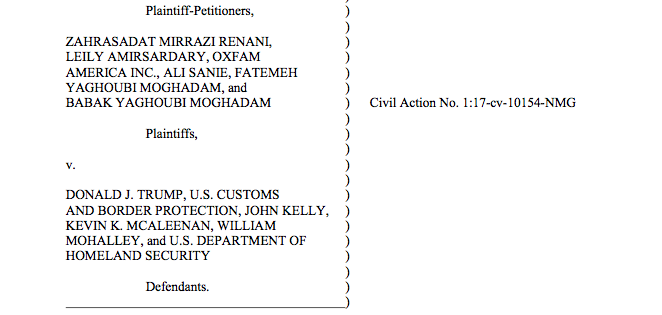Northeastern files amicus brief opposing immigration executive order
February 4, 2017
Updated at 4:40 p.m. on Feb. 5.
Northeastern joined seven other universities Friday in filing an amicus brief opposing President Donald J. Trump’s executive order banning travelers and immigrants from seven Muslim-majority countries from entering the United States.
University President Joseph E. Aoun announced the amicus brief Sunday morning in an e-mail to the Northeastern community, in which he called Trump’s executive order “antithetical to our core values and completely unacceptable.” According to the brief and Aoun’s e-mail, 250 Northeastern students and 31 faculty and staff are potentially affected by the ban—more than any other university that signed onto the brief.
“Our brief makes clear that the executive order imperils our ability to have students and scholars collaborate and advance knowledge across borders,” Aoun wrote. “The order represents a threat to the mission of global higher education. In the aftermath of this executive order, it has become abundantly clear that the integration of diverse people, ideas, and cultures—which universities like Northeastern make possible—is more important than ever before.”
The amicus brief aligns eight Massachusetts universities with an existing suit that lists eight plaintiffs, two of whom are University of Massachusetts Dartmouth associate professors who were detained at Logan International Airport for three hours last weekend, according to a Northeastern University press release. The brief states the suit is filed against Trump, U.S. Customs and Border Protection, U.S. Department of Homeland Security and three officials within those departments.
Boston College, Boston University, Brandeis University, Harvard University, Massachusetts Institute of Technology, Tufts College and Worcester Polytechnic Institute also signed the brief.
Trump signed the executive order Jan. 27 banning citizens of Iraq, Iran, Libya, Syria, Sudan, Somalia and Yemen from entering the country for 90 days.
The university action comes after university President Joseph E. Aoun issued a statement earlier this week which said the Office of Global Services is ready to assist any Northeastern students, faculty or staff who might be affected. University officials had already reached out to students they believed might be impacted by the order, according to the statement.
“All in our community—especially those who feel vulnerable as a result of this new paradigm—should feel safe and secure at Northeastern,” Aoun said in the Jan. 28 e-mail. “We, the leadership of the university, stand with you and will pursue every means available to safeguard each of you—students, faculty and staff.”
The universities, referred to as “amici” within the brief, joined the suit because they each have global networks for international learning, research and education and employ faculty across the globe, all of which is threatened by the immigration and travel ban, according to the brief.
“Over the course of the week, amici institutions have seen their students stranded abroad and their faculty members prevented from traveling to and from foreign countries,” the brief read. “Scholars based abroad have expressed a determination to boycott academic conferences in the United States, and potential faculty recruits have expressed serious doubts about teaching at amici’s schools. These consequences undermine amici’s bedrock commitment to serving the Commonwealth of Massachusetts, the United States, and the world through innovative teaching and research.”
Two federal judges granted a temporary order against enforcing Trump’s ban in Boston Sunday, but the order will expire a week from being initiated on this coming Sunday, according to the university statement. A federal judge declined to renew the restraining order on Trump’s travel ban Friday, but a Seattle judge rebuked the decision and ordered a national halt on the ban.
The brief said that restricting international travel puts the listed universities’ academic achievement and economic growth at risk.
“It is essential that our commitments to national security not unduly stifle the free flow of ideas and people that are critical to progress in a democratic society,” the brief read. “The inquiry, innovation, and invention that take place every day within amici’s classrooms, libraries, and laboratories depend on the ability of scholars and students to travel to and from the United States.”







